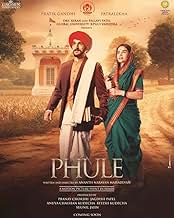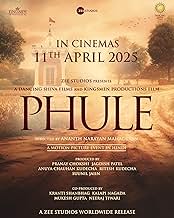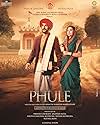Phule
- 2025
- 2h 9min
VALUTAZIONE IMDb
8,1/10
2608
LA TUA VALUTAZIONE
Aggiungi una trama nella tua linguaA husband and wife, it was the time of child marriage when girl child was refused education and pushed into marriage, he chose to educate his wife and were a social reformer they went to cam... Leggi tuttoA husband and wife, it was the time of child marriage when girl child was refused education and pushed into marriage, he chose to educate his wife and were a social reformer they went to campaign for increased rights for underprivileged.A husband and wife, it was the time of child marriage when girl child was refused education and pushed into marriage, he chose to educate his wife and were a social reformer they went to campaign for increased rights for underprivileged.
- Regia
- Sceneggiatura
- Star
Recensioni in evidenza
Watching this film, I got thrilled. It was like we are in that era and experiencing those things.
It is real history, we can learn from this movie that we don't have to repeat history again.
We should concentrate on wellbeing of our society, than the Jati-Dharma controversy.
The actor done his best, the direction of the film is also stay you seated.
This movie shows the real struggle of the great people at that era.
I think everyone should watch this movie with their family. There was not any hate content related to perticular caste because that caste itself was helping to Mahatma Jyotiba phule.
It is real history, we can learn from this movie that we don't have to repeat history again.
We should concentrate on wellbeing of our society, than the Jati-Dharma controversy.
The actor done his best, the direction of the film is also stay you seated.
This movie shows the real struggle of the great people at that era.
I think everyone should watch this movie with their family. There was not any hate content related to perticular caste because that caste itself was helping to Mahatma Jyotiba phule.
Phule is not just a movie - it's an eye-opener. Every woman in India must watch this film to truly understand the harsh reality of where we come from, and what could have been if visionaries like Jyotirao and Savitribai Phule hadn't fought relentlessly for women's education.
The film sheds light on the brutal oppression faced by women, regardless of their caste - even Brahmin women - and how deeply entrenched the system was in denying them the basic right to education. Had Phule not challenged the orthodoxy and dared to fight against the system, the lives of Indian women today could have been drastically different - far worse and far more suppressed.
Phule serves as a stark reminder that rights like education, dignity, and equality were hard-won, not granted easily. It's a warning too - if women today do not stay vigilant and assert their rights, there is always the danger of slipping back into the same dark times, where, under the guise of religion and tradition, women's freedoms could again be curtailed.
The right to life, liberty, and education is not just for men - women must recognise this and fight to protect it. Watch Phule not just as a movie, but as a call to action.
The film sheds light on the brutal oppression faced by women, regardless of their caste - even Brahmin women - and how deeply entrenched the system was in denying them the basic right to education. Had Phule not challenged the orthodoxy and dared to fight against the system, the lives of Indian women today could have been drastically different - far worse and far more suppressed.
Phule serves as a stark reminder that rights like education, dignity, and equality were hard-won, not granted easily. It's a warning too - if women today do not stay vigilant and assert their rights, there is always the danger of slipping back into the same dark times, where, under the guise of religion and tradition, women's freedoms could again be curtailed.
The right to life, liberty, and education is not just for men - women must recognise this and fight to protect it. Watch Phule not just as a movie, but as a call to action.
This show courageously tackles some of the darkest realities of Indian society - the deep-rooted caste system, the discriminatory Varna system, and the oppressive ideology of Brahminism. It fearlessly pulls back the curtain on practices that have been normalized for centuries but are fundamentally unjust and inhumane. The show does not shy away from exposing how systems like untouchability and caste-based segregation have perpetuated inequality and suffering for generations.
What stands out most is how the series challenges the myth of "Hindu unity" - a notion often propagated in political and cultural spheres. By depicting the lived experiences of people from oppressed castes, the show reveals that the so-called unity is often a facade, papering over the brutal realities of social hierarchies and exclusion. The narrative makes it painfully clear that many marginalized communities have been historically excluded from the promises of equality and dignity, despite rhetoric claiming otherwise.
The depiction of Brahminism here is particularly bold and unflinching. It is not treated as a benign cultural tradition but shown for what it often becomes in practice: a tool for social control and discrimination. The show rightly distinguishes between faith and the exploitative structures built around it. It exposes how Brahminical supremacy has been maintained through myths, rituals, and systemic control over knowledge and resources. By doing so, it challenges viewers to rethink assumptions that have been passed down without question.
Another powerful aspect is how the show gives voice to the oppressed. Instead of romanticizing suffering or offering token representation, it lets the marginalized speak their truth. Their anger, their grief, and their resistance are given center stage. It's a breath of fresh air compared to the mainstream narratives that either ignore or sanitize these harsh realities.
In terms of storytelling, the series is hard-hitting and uncompromising. It does not dilute its message to appeal to broader audiences, nor does it resort to unnecessary melodrama. Instead, it presents a raw, honest portrayal that forces the viewer to confront uncomfortable truths. Every scene feels charged with purpose - to educate, to awaken, and to demand change.
This kind of work is rare in Indian media, where the mainstream often glorifies ancient systems without critical examination. The courage shown by the creators deserves immense appreciation. They have taken significant risks in choosing to expose the fraudulence and brutality inherent in Brahminism and the caste system. It is a bold act of truth-telling, and it will undoubtedly spark necessary conversations.
At the same time, it's important to recognize that the show is not an attack on individual faith or spirituality. It draws a clear line between personal belief and systemic oppression. The criticism is directed at the caste-based discrimination institutionalized through social and religious practices, not at any particular individual's right to their faith. This distinction is crucial and handled thoughtfully throughout the series.
In conclusion, this show is a must-watch for anyone who wants to understand the harsh realities of caste in India beyond sanitized textbooks and propaganda. It dares to say what needs to be said: that discrimination is woven deep into social structures, and true equality demands confronting these uncomfortable truths head-on. It is an eye-opener, a conversation starter, and a brave step toward dismantling age-old injustices.
Highly recommended for those who value truth, justice, and real social progress. Bravo to the creators for their fearless and much-needed work.
What stands out most is how the series challenges the myth of "Hindu unity" - a notion often propagated in political and cultural spheres. By depicting the lived experiences of people from oppressed castes, the show reveals that the so-called unity is often a facade, papering over the brutal realities of social hierarchies and exclusion. The narrative makes it painfully clear that many marginalized communities have been historically excluded from the promises of equality and dignity, despite rhetoric claiming otherwise.
The depiction of Brahminism here is particularly bold and unflinching. It is not treated as a benign cultural tradition but shown for what it often becomes in practice: a tool for social control and discrimination. The show rightly distinguishes between faith and the exploitative structures built around it. It exposes how Brahminical supremacy has been maintained through myths, rituals, and systemic control over knowledge and resources. By doing so, it challenges viewers to rethink assumptions that have been passed down without question.
Another powerful aspect is how the show gives voice to the oppressed. Instead of romanticizing suffering or offering token representation, it lets the marginalized speak their truth. Their anger, their grief, and their resistance are given center stage. It's a breath of fresh air compared to the mainstream narratives that either ignore or sanitize these harsh realities.
In terms of storytelling, the series is hard-hitting and uncompromising. It does not dilute its message to appeal to broader audiences, nor does it resort to unnecessary melodrama. Instead, it presents a raw, honest portrayal that forces the viewer to confront uncomfortable truths. Every scene feels charged with purpose - to educate, to awaken, and to demand change.
This kind of work is rare in Indian media, where the mainstream often glorifies ancient systems without critical examination. The courage shown by the creators deserves immense appreciation. They have taken significant risks in choosing to expose the fraudulence and brutality inherent in Brahminism and the caste system. It is a bold act of truth-telling, and it will undoubtedly spark necessary conversations.
At the same time, it's important to recognize that the show is not an attack on individual faith or spirituality. It draws a clear line between personal belief and systemic oppression. The criticism is directed at the caste-based discrimination institutionalized through social and religious practices, not at any particular individual's right to their faith. This distinction is crucial and handled thoughtfully throughout the series.
In conclusion, this show is a must-watch for anyone who wants to understand the harsh realities of caste in India beyond sanitized textbooks and propaganda. It dares to say what needs to be said: that discrimination is woven deep into social structures, and true equality demands confronting these uncomfortable truths head-on. It is an eye-opener, a conversation starter, and a brave step toward dismantling age-old injustices.
Highly recommended for those who value truth, justice, and real social progress. Bravo to the creators for their fearless and much-needed work.
Phule is a moving cinematic salute to the life and work of Jyotirao Phule, which is rich in historical detail yet full of emotional depth. The movie beautifully depicts his struggle as a reformer who battled social discrimination, and with outstanding performances by the cast that bring each character to life. The performance of the lead actor as Jyotirao is both poignant and inspiring, whereas the supporting cast, particularly the portrayal of Savitribai Phule, brings warmth and vigor to the story. Breathtaking visuals and a soulful soundtrack take audiences to 19th-century India, situating them in its struggle and glory. Universal themes of justice, perseverance, and equality make the film a relevant experience for audiences across generations. Must go with family and watch this movie.
If I was watching this movie at home I probably would stop.
As I went to the theatre and spent money on it so I have to make my eyes open.
The struggle of history is not shown in this movie because it seems everything is just happening here very smoothly.
The story is not portrayed well here by the director.
My brother was insisting me to go for thunderbolt as he likes marvel but I assured him that phule would be a great choice but. Whn we went to see it the first half was okay we didn't bore but in the latter one we were like "let's go home we should not watch this anymore and there is no necessary to watch this.
As I went to the theatre and spent money on it so I have to make my eyes open.
The struggle of history is not shown in this movie because it seems everything is just happening here very smoothly.
The story is not portrayed well here by the director.
My brother was insisting me to go for thunderbolt as he likes marvel but I assured him that phule would be a great choice but. Whn we went to see it the first half was okay we didn't bore but in the latter one we were like "let's go home we should not watch this anymore and there is no necessary to watch this.
I più visti
Accedi per valutare e creare un elenco di titoli salvati per ottenere consigli personalizzati
- How long is Phule?Powered by Alexa
Dettagli
Botteghino
- Lordo in tutto il mondo
- 1454 USD
- Tempo di esecuzione
- 2h 9min(129 min)
- Colore
Contribuisci a questa pagina
Suggerisci una modifica o aggiungi i contenuti mancanti

![Guarda Trailer [OV]](https://m.media-amazon.com/images/M/MV5BMzdkNWRjMmEtN2Q2NC00MjM0LTljOTQtZGE5OTQ4YzMxYjk1XkEyXkFqcGdeQXRyYW5zY29kZS13b3JrZmxvdw@@._V1_QL75_UX500_CR0)































